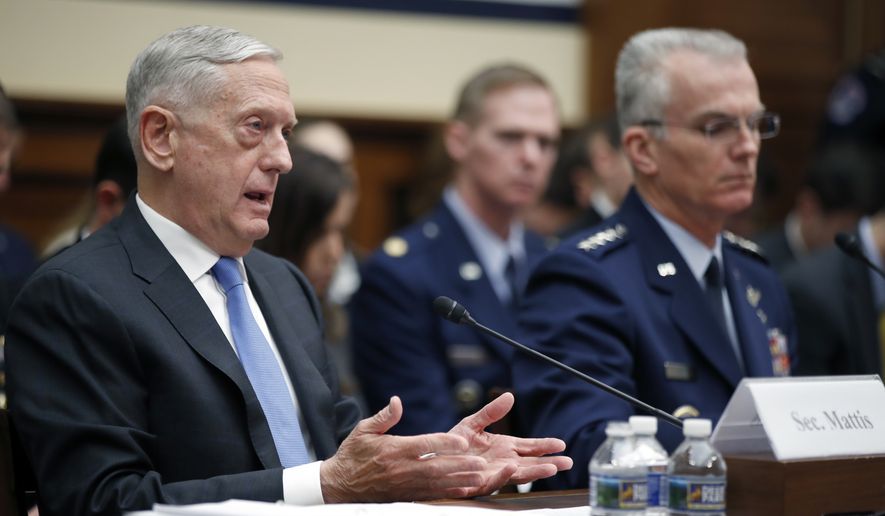The U.S. military is facing “security vulnerabilities” because of the long funding stalemate on Capitol Hill, Defense Secretary James Mattis told Congress Tuesday, warning the Pentagon’s readiness woes will only worsen the longer a long-term deal remains out of reach.
The former Marine general issued his warning to Congress during a House Armed Services Committee hearing, a warning that committee Chairman Mac Thornberry, Texas Republican, said was the starkest he could remember from a defense secretary.
Mr. Mattis said the stopgap budgets — and the prospect of a possible new government shutdown in the coming days — were affecting readiness, morale and the Pentagon’s ability to forge coherent long-term strategy.
“I regret that without sustained, predictable appropriations, my presence here today wastes your time, because no strategy can survive without the funding necessary to resource it,” Mr. Mattis said.
On a separate issue, Mr. Mattis said the Trump administration’s new proposal to add a sea-launched cruise missile to the U.S. nuclear arsenal, criticized by some as overkill, is meant to provide new negotiating leverage to U.S. diplomats trying to persuade Russia to end violations of a key arms control treaty.
“The idea is, once again, to keep our negotiators negotiating from a position of strength,” Mr. Mattis told the committee hearing, which was called to review on the administration’s new Nuclear Posture Review, which was released last week. The report proposes two new nuclear weapons: a sea-launched cruise missile and a lower-yield version of an existing ballistic missile, the Associated Press reported.
The Pentagon is seeking $700 billion for the current fiscal year 2018 and $719 billion for next budget year that begins in October. But Mr. Mattis’ testimony comes as lawmakers in both chambers remain deadlocked on a way ahead for a temporary government funding measure, known as a continuing resolution, and avoid another government shutdown. The current resolution is set to expire on Feb. 8.
Rep. Adam Smith, the ranking Democrat on the House panel, chastised his GOP counterparts for holding defense spending hostage to domestic funding disputes, “as if those domestic political priorities were some kind of luxury that, you know, we just engage in for fun and enjoyment and aren’t really important.”
Mr. Mattis said the uncertainty was a major headache for his military planners.
“I take no issue with the fact that we need to have regular order across all government expenditures. Unfortunately, right now, what we’re doing is we’re creating security vulnerabilities that can no longer be denied,” Mr. Mattis told committee members.
“We cannot do new starts, we cannot get into cyber protection or the very things you hold dear” due to financial uncertainty.
Ohio Republican Rep. Mike Turner said the blame lay with Senate Democrats.
“We really are dealing with a handful of those in the Senate who are causing inaction,” he said during the House hearing, noting the lower chamber already passed their version of the defense spending bill for the current fiscal year, as well as three defense appropriations bills. The House Tuesday evening passed another short-term funding package that included a full year of appropriation for the Department of Defense for the fiscal year.
“I certainly call on Democratic leadership in the Senate to dislodge the defense funding for the military, because of the various reasons that you’re giving us of the damage that’s occurring by connecting defense funding to other items,” he told Mr. Mattis.
Chief of Naval Operations Adm. John Richardson said last week that budget, training and readiness shortfalls were a prime contributor to a slew of accidents and fatal at-sea collisions suffered by the service last year, resulting in the deaths of nearly 20 U.S. sailors.
Senate Minority Leader Charles Schumer said Tuesday that pairing a long-term boost for defense with a short-term extension for domestic programs wouldn’t be able to pass the Senate. Republicans, though, are pushing for a bigger boost on the defense side, saying discretionary spending limits have fallen disproportionately on the military since 2011, when lawmakers approved the caps.
But both Mr. Schumer, New York Democrat, and Senate Majority Leader Mitch McConnell of Kentucky said they are now optimistic about striking a long-sought deal to lift the spending caps for both defense and non-defense, reportedly by some $300 billion over two years.
• Staff writers David Sherfinski and S.A. Miller contributed to this article, which was based in part on wire service reports.
• Carlo Muñoz can be reached at cmunoz@washingtontimes.com.




Please read our comment policy before commenting.